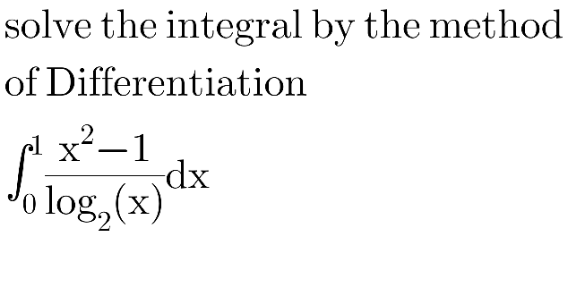
Question Number 195910 by Calculusboy last updated on 13/Aug/23

Answered by witcher3 last updated on 20/Aug/23
![Methode of differentiation ? A=ln(2)∫_0 ^1 ((x^2 −1)/(ln(x)))dx A(a)=ln(2)∫_0 ^1 ((x^a −1)/(ln(x)))dx,a≥0 x→((x^a −1)/(ln(x))),x→1,a>0 =((x−1)/(ln(x))).((x^a −1)/(x−1)),((x−1)/(ln(x)))→1 ((x^a −1)/(x−1))→a ⇒((x^a −1)/(ln(x)))→a, integrable near 1,near 0 →0 also its riemann integrabl+ continuity⇒ uniformaly continue ∀x∈[0,1]x→((x^a −1)/(ln(x)))is differwntiable as function of variable a⇒we can switch ∫ and ∂ in E A(0)=0,A=∫_0 ^2 A′da A′=ln(2)∫_0 ^1 ∂_a ((e^(aln(x)) −1)/(ln(x)))dx=∫_0 ^1 x^a dx=(1/(a+1))..E A=ln(2)∫_0 ^2 (1/(a+1))da=ln(2)ln(3)](Q196255.png)
$$\mathrm{Methode}\:\mathrm{of}\:\mathrm{differentiation}\:? \\ $$$$\mathrm{A}=\mathrm{ln}\left(\mathrm{2}\right)\int_{\mathrm{0}} ^{\mathrm{1}} \frac{\mathrm{x}^{\mathrm{2}} −\mathrm{1}}{\mathrm{ln}\left(\mathrm{x}\right)}\mathrm{dx} \\ $$$$\mathrm{A}\left(\mathrm{a}\right)=\mathrm{ln}\left(\mathrm{2}\right)\int_{\mathrm{0}} ^{\mathrm{1}} \frac{\mathrm{x}^{\mathrm{a}} −\mathrm{1}}{\mathrm{ln}\left(\mathrm{x}\right)}\mathrm{dx},\mathrm{a}\geqslant\mathrm{0} \\ $$$$\mathrm{x}\rightarrow\frac{\mathrm{x}^{\mathrm{a}} −\mathrm{1}}{\mathrm{ln}\left(\mathrm{x}\right)},\mathrm{x}\rightarrow\mathrm{1},\mathrm{a}>\mathrm{0} \\ $$$$=\frac{\mathrm{x}−\mathrm{1}}{\mathrm{ln}\left(\mathrm{x}\right)}.\frac{\mathrm{x}^{\mathrm{a}} −\mathrm{1}}{\mathrm{x}−\mathrm{1}},\frac{\mathrm{x}−\mathrm{1}}{\mathrm{ln}\left(\mathrm{x}\right)}\rightarrow\mathrm{1} \\ $$$$\frac{\mathrm{x}^{\mathrm{a}} −\mathrm{1}}{\mathrm{x}−\mathrm{1}}\rightarrow\mathrm{a}\:\Rightarrow\frac{\mathrm{x}^{\mathrm{a}} −\mathrm{1}}{\mathrm{ln}\left(\mathrm{x}\right)}\rightarrow\mathrm{a},\:\mathrm{integrable}\:\mathrm{near}\:\mathrm{1},\mathrm{near}\:\mathrm{0} \\ $$$$\rightarrow\mathrm{0}\:\:\mathrm{also}\:\mathrm{its}\:\mathrm{riemann}\:\mathrm{integrabl}+\:\mathrm{continuity}\Rightarrow \\ $$$$\mathrm{uniformaly}\:\mathrm{continue}\: \\ $$$$\forall\mathrm{x}\in\left[\mathrm{0},\mathrm{1}\right]\mathrm{x}\rightarrow\frac{\mathrm{x}^{\mathrm{a}} −\mathrm{1}}{\mathrm{ln}\left(\mathrm{x}\right)}\mathrm{is}\:\mathrm{differwntiable}\:\mathrm{as}\:\mathrm{function} \\ $$$$\mathrm{of}\:\mathrm{variable}\:\mathrm{a}\Rightarrow\mathrm{we}\:\mathrm{can}\:\mathrm{switch}\:\int\:\mathrm{and}\:\partial\:\mathrm{in}\:\mathrm{E} \\ $$$$\mathrm{A}\left(\mathrm{0}\right)=\mathrm{0},\mathrm{A}=\int_{\mathrm{0}} ^{\mathrm{2}} \mathrm{A}'\mathrm{da} \\ $$$$\mathrm{A}'=\mathrm{ln}\left(\mathrm{2}\right)\int_{\mathrm{0}} ^{\mathrm{1}} \partial_{\mathrm{a}} \frac{\mathrm{e}^{\mathrm{aln}\left(\mathrm{x}\right)} −\mathrm{1}}{\mathrm{ln}\left(\mathrm{x}\right)}\mathrm{dx}=\int_{\mathrm{0}} ^{\mathrm{1}} \mathrm{x}^{\mathrm{a}} \mathrm{dx}=\frac{\mathrm{1}}{\mathrm{a}+\mathrm{1}}..\mathrm{E} \\ $$$$\mathrm{A}=\mathrm{ln}\left(\mathrm{2}\right)\int_{\mathrm{0}} ^{\mathrm{2}} \frac{\mathrm{1}}{\mathrm{a}+\mathrm{1}}\mathrm{da}=\mathrm{ln}\left(\mathrm{2}\right)\mathrm{ln}\left(\mathrm{3}\right) \\ $$
